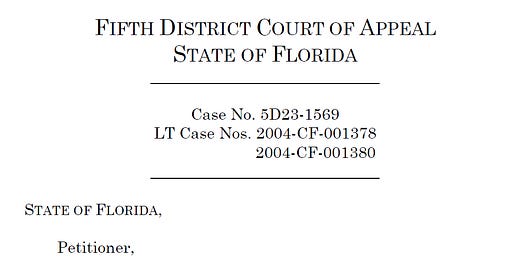BREAKING: Fifth DCA issues written opinion in Hunter and Victorino
The Fifth DCA issued an opinion explaining its decision to grant the State’s emergency petition for writ of certiorari, ruling that the 2023 statute applies to Hunter & Victorino's resentencing.
This afternoon, the Fifth District Court of Appeal issued a written opinion explaining its decision earlier this year to grant the State’s emergency petition for writ of certiorari in the cases of Hunter and Victorino, ruling that Florida’s 2023 capital sentencing scheme applies to their resentencing proceedings.
The full decision can be downloaded here.
Judge Jay wrote the majority decision.
First, as to the Court’s jurisdiction, the decision says that it has jurisdiction to hear the issue because “it has long been settled that district courts may lawfully consider challenges to interlocutory orders in death penalty cases.” Further, “the Supreme Court’s mandatory, exclusive jurisdiction did not attach” because “a final judgment imposing the death penalty” had not been issued.
On the merits, the majority determines that the State would clearly suffer irreparable harm if the trial court improperly applied the old statute that “required the State to convince all twelve jurors that death is the appropriate sentence.”
As to the change in the law after Hunter and Victorino were indicted, the Court says that it is not an ex post facto violation because the law “is a quintessentially procedural change that has no substantive effect.” The Court further says “it is irrelevant that the current version of section 921.141 became law after jury selection started,” which was the turning point in the lower court’s reasoning, because “[c]riminal jeopardy attaches when a jury—not a group of prospective jurors—is sworn.” The Court explained:
Here, the court did not swear the selected jury until after the current version of section 921.141 became law. The fact that jury selection began on April 10 did not insulate these proceedings from an amendment to a procedural law that took effect before the jury was sworn and heard any evidence.
Judge Lambert Concurring Specially
Judge Lambert concurred with the majority and wrote a concurring specially opinion to address “a somewhat inconsistent position being taken by” Victorino regarding his right to apply Florida’s unanimity statute to his case.
The beginning of the separate opinion includes a footnote that notes how difficult death penalty trials are for the judges:
I am not unsympathetic to the trial judge and the unusual predicament that he faced. Having presided over several death penalty trials when I was a circuit judge, I know that they can be difficult, stressful, and time-consuming, especially where, as here, a mistrial is subsequently declared by the judge and the entire trial process necessarily starts over.
Judge Harris Concurring in Part, Dissenting in Part
Judge Harris wrote a concurring in part, dissenting in part opinion, agreeing “that the trial court erred in refusing to apply” the new statute but disagreeing that certiorari relief is appropriate, explaining:
As the majority correctly points out, jury selection in this resentencing trial began two weeks before the new statute went into effect. During that time, approximately 200 potential jurors were questioned regarding, among other things, their feelings about the death penalty and whether they would be able to recommend a sentence of death under the appropriate circumstances. During this process, the prospective jurors were repeatedly advised by the trial judge that it would take the vote of all twelve jurors in order for the court to impose a death sentence. A panel of jurors was ultimately “death qualified,” selected, and sworn. However, when they expressed their ability and willingness to follow the law, they did so with the clear understanding that unanimity would be required before the Respondent could receive a death sentence. We do not know, partly because the trial court refused to allow additional questioning of the jurors, if their answers during voir dire would have been different had they known that only two-thirds of them would need to recommend a death sentence as opposed to all twelve. We do not know, for the same reason, whether any reservations, issues, or concerns they may have with the death penalty would have been affected if they were advised that only eight of them would be needed to make that recommendation. The problems created by application of the current law could have been remedied by simply allowing limited additional questioning of the jurors or by starting the selection process over.
Because “death is different,” I cannot join that portion of the majority opinion that would have directed the trial court to proceed with this trial and this particular jury under materially different ground rules on such a critical issue.
TFDP Prior Coverage on This Case
Fifth DCA’s Order granting Petition



